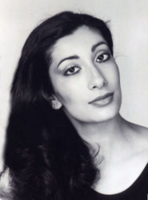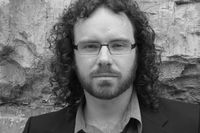Daniel Scott Tysdal & Priscila Uppal on the Strange Magic of Teaching Creative Writing
How best to teach creative writing? It's a question that inspires strong opinions amongst writers, students, and instructors. Many writers acknowledge professors and mentors as instrumental in their success and development, but no two instructors take exactly the same approach.
In order to examine the strange alchemy, joys, and challenges of teaching creative writing, Daniel Scott Tysdal and Priscila Uppal have brought together some of Canada's most respected authors and writing teachers in Writing Creative Writing: Essays from the Field (Dundurn Press). The book's third editor, celebrated poet and professor Rishma Dunlop, passed away in 2016 after working with Tysdal and Uppal to curate the essays.
Writing Creative Writing includes offerings from Catherine Bush, Suzette Mayr, Judith Thompson, and thom vernon (to name just a few) and are thoughtful, funny, and inspiring for anyone who writes, teaches, or hopes to do either. With advice about how to teach various genres, including strategies and exercises, the essays inspired veteran creative writing teacher and founder of the Humber School for Writers Joseph Kertes to call the book "a must for Canadian writers, aspiring and established."
We're excited to welcome Daniel and Priscila to Open Book today to participate in a most appropriate interview: our Teach Me to Write interview, which is about, you guessed it, teaching creative writing. Daniel and Priscila share their own views here, including their approaches to teaching writing, how "teaching" means much more for writers than simply what happens in the classroom, and the best advice they ever received themselves as emerging writers. They also share the touching tribute to Dunlop which has been organized around the book.
Open Book:
What is your approach or philosophy as a creative writing teacher?
Daniel Scott Tysdal:
A focus on practice underpins my creative writing pedagogy. This materializes in a number of ways. First, in the classroom and my lessons, I follow the motto: “practice precedes abstraction”—write first, get hands-on experience with a tool or tradition, then define and discuss. Second, I guide students to engage their practice in all facets of their life, showing them that their practice involves not only writing, but how they read, talk, think, and pay attention to the world. Finally, I encourage students to see that it is their practice that will sustain them. All the products—publications, awards, etc.—are rare and fleeting but our practice is with us all the time to challenge, connect, and transform us.
Priscila Uppal:
I used to say that I teach creative writing with a little bit of life lessons tossed in for free. Now I say that I teach life lessons with a little creative writing tossed in for free. This in no way takes away from all the very practical writing skills my students learn and that they manage to push themselves as writers to new heights throughout the course. In fact, it’s because of the ways in which writing teaches us about life, about how to understand ourselves and the world around us, about how to make connections and about when it’s best to opt out of our cultural truths and invent our own, that both satisfying and compassionate living and writing is possible.
OB:
Do you think good writing can be taught?
DST:
I want to both answer and counter this question. First, to answer: absolutely. Writing, like any craft, can be taught. Each of us can be taught to be our best writing selves. Second, to counter: name one good writer who was not taught? That’s why this question has always struck me as weird. Are there really good writers who have never read a book, talked shop with a friend, received advice from an editor or peer, and so on? Aren’t the books we first read our first teachers?
PU:
I agree with Daniel. What is teaching? We are taught how to write by our parents, by our movies, by our maple tree in the front yard, by our morning showers, by our coffees with friends and proseccos on rooftops, by scientific experiments, by falling in love. And sometimes also by sitting in a classroom of people willing to explore themselves and language and to take risks and in the process teach ourselves and each other.
Your CanLit News
Subscribe to Open Book’s newsletter to get local book events, literary content, writing tips, and more in your inbox
OB:
What was the most important thing you’ve learned from a writing teacher or mentor?
DST:
So much of our success as writers depends on luck. I didn’t really get this advice at the time, but now I understand it provides a number of writer-friendly benefits. It keeps us humble. It helps us avoid becoming resentful and bitter (one of the worst occupational hazards). It stops us from making insulting and clueless claims like, “I’m not lucky. I work hard.” (News flash: everyone works hard.) It encourages us to value practice over product, which in turn makes us better writers, writing buddies, teachers, and community members.
PU:
“Do not fall in love with anyone in this class. Spend some time hanging out in the cafeteria at the Law School or Engineering Building. Don’t romanticize poverty. You will fall in love with whoever is close to you in physical proximity. Do not fall in love with the person sitting beside you in this creative writing class. Someone at the Law School or Engineering Building will find you mysterious and want to support you while you create dreams they can feel they’ve had a part in.” Seriously. It’s not bad advice. It’s not advice I took. But it’s not bad advice. I actually did fall in love with someone sitting beside me in creative writing class.
OB:
How do you view the value of the workshop environment vs. the mentor environment?
PU:
I think they can work well together. But overall, I think a younger or less experienced writer will benefit more from a workshop environment so that they are constantly exposed to other ways of writing. Having a specific mentor too soon can sometimes lead to acolytes rather than original voices. However, once that original voice has found its confidence in can be very helpful to have a mentor to help with the more tailored needs of a writer as they start to shape a significant body of work that they think is ready to put out into the world.
OB:
What, in your view, are the most important qualities in a writing instructor?
PU:
Curiosity, compassion, humour, willingness to listen and willingness to be generous with one’s own experiences both as a writer and as a human being. More and more I find my students are not just looking for writing advice, but also for some wisdom, and for acknowledgment of who they are today and who they might be tomorrow. Nothing is more important than that.
OB:
What can you tell us about your most recent book?
PU & DST:
Writing Creative Writing is the first book of its kind in Canada, bringing together some of the country’s most respected writers and writing teachers to discuss the joys and challenges of the creative writing field in its myriad facets—as teachers of many genres and in many different environments, as practitioners of crafts and experiments, as researchers into different forms of knowledge and multidisciplinary fields, as industry professionals and administrators. The book was conceived alongside the formation of the CCWWP (Canadian Creative Writers and Writing Programs Association) to bring together the range and vibrancy of the discussions we writers have with each other and with our colleagues around the world into a thoughtful and enlightening book with lots of practical strategies for teaching and living and writing creative writing.
The book is dedicated to one of the editors, Rishma Dunlop. All advances and royalties are being donated to the CCWWP in memory of Rishma, who was one of the pioneers of advocating for the field of Creative Writing to be understood as a vital and essential form of knowledge creation.
_____________________________
Rishma Dunlop was an award-winning poet, playwright, essayist, and translator. She was a Professor of Creative Writing and Education at York University and a Fellow of the Royal Society of Canada. Her publications include Lover Through Departure, Metropolis, and White Ink: Poems on Mothers and Motherhood.
Daniel Scott Tysdal is an award-winning writer and professor at the University of Toronto Scarborough. He is the author of Fauxccasional Poems, Predicting the Next Big Advertising Breakthrough Using a Potentially Dangerous Method, and a poetry textbook, The Writing Moment: A Practical Guide to Creating Poems. Daniel lives in Toronto.
Priscila Uppal is an internationally acclaimed poet, prose writer, and playwright. A York University professor and Fellow of the Royal Society of Canada, she is the author of Ontological Necessities and Cover Before Striking. Her memoir, Projection: Encounters with My Runaway Mother, was shortlisted for the Hilary Weston Prize and a Governor General’s Award. Priscila lives in Toronto.






